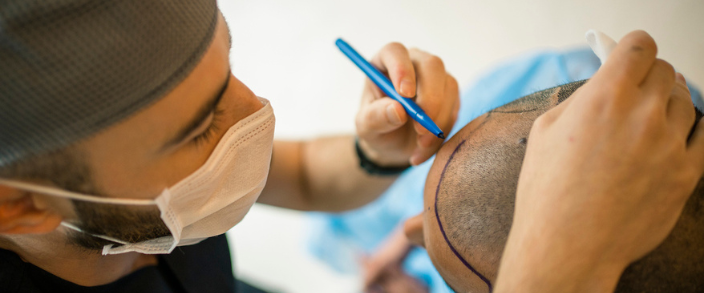
Hair Transplants: Are They Worth It?
Hair Transplants: Are They Worth It?
Are you considering a hair transplant? If so, you're not alone. Hair transplants are a popular solution for hair loss, but they're not without their risks.
Ultimately, whether a hair transplant is worth it depends on your circumstances. If you are unhappy with your appearance and struggle with a lack of confidence due to hair loss, a hair transplant could be for you.
However, if you are not too bothered by your hair loss or don’t want to spend a small fortune, then a permanent hair transplant may not be necessary – and there are other solutions for you to consider.
Here, our team explains what the pros and cons of hair transplants are to help you decide if they're right for you.
What are hair transplants?
Hair transplants are a surgical procedure to address hair loss. The process involves taking hair from an area of the scalp where hair is thick and then transplanting it to an area where hair is thin or balding.
This hair restoration procedure is usually performed on men to treat male pattern baldness, which is the most common type of hair loss.
There are two types of hairline transplant procedure. There is FUT - follicular unit transplantation and there is FOE - follicular unit extraction.
- FUT is the more traditional of the two procedures. It involves removing a strip of hair-bearing skin from the back of the head and then surgically transplanting the hair follicles to the balding area.
- FUE, on the other hand, involves individually removing hair follicles from the back of the head and then transplanting them to the balding area.
Both of the hair implants for men procedures are performed under local anaesthetic and take several hours to complete. Recovery time is typically around two weeks.
Can women have hair transplants?
While this article is aimed at men with male pattern baldness considering hair transplants, it's also worth asking, 'Can women have hair transplants?'.
Hair transplants can be performed on women, but the procedure is not as effective for treating female pattern baldness as it is in treating male baldness.
This is because female pattern baldness often results in diffuse thinning rather than localised balding, making it more difficult to harvest hair follicles for transplantation.
The pros of hair transplants
If you are considering a hair transplant, there are some pros, including:
- Hair transplants can give you back the hair you've lost, and they can be very effective
- They are usually permanent, so you won't have to keep getting them done
- Hair transplants can be very natural looking, and if done properly, no one will be able to tell that you've had one.
The bottom line is that a hair transplant could restore your hairline and give you back your confidence.
But it's not all great news - there are some drawbacks to consider, as we will see next.
The cons of hair transplants
While there is a lot to recommend hair transplants, there are some cons to consider too, including:
- Hair transplants can be expensive – and health insurance doesn’t usually cover them
- Hair transplants are a surgery, so there are risks involved, including infection and scarring
- The results are not guaranteed and don't always work
- You may not be happy with the results and need more transplants.
The risks of hair transplants
Having mentioned the cons, you need to know the risks of hair transplants, and these include:
- Infection
- Bleeding
- Scarring
- Pain
- Numbness
- Swelling
- Itching scalp.
The best candidates for hair transplants
Who are the best candidates for hair transplant for receding hairline? According to the American Academy of Dermatology (AAD), hair transplants tend to be successful in people who:
- Are just beginning to experience hair loss
- Have localised hair loss (in other words, their hair loss is limited to one area of their scalp)
- Have healthy hair on the sides and back of the head (this hair is used to transplant to the thinning or balding areas)
- Are willing to undergo multiple procedures
- Are willing to take care of their transplanted hair
- Have realistic expectations about the results.
If you're considering a hair transplant, be sure to talk to a dermatologist or other qualified medical professionals to see if you're a good candidate. They can help you weigh the pros and cons and make the best decision for your needs.
How many hairs will I need for a transplant?
The answer to the question, 'How many hairs will I need for a transplant?' will depend on the size of the balding or thinning area.
Typically, around 2,000 to 4,000 follicles (those are the individual hair units) are transplanted in one session.
Will I have enough hair for a transplant?
Having enough hair for a transplant is a common concern among people considering hair transplants.
The good news is that, in most cases, you will have enough hair for a transplant.
Even people with advanced hair loss typically have enough donor hair to make a transplant possible.
Is a hair transplant right for me?
If you are now wondering whether a hair restoration for men procedure is worth it, then it's time to consider this checklist:
- Look at the risks involved. Hair transplants are a surgical procedure, which means there are potential risks and complications that can occur. These risks include infection, bleeding, scarring, and even death in very rare cases.
- Consider the cost. Hair transplants can be expensive, and they're not typically covered by insurance. The cost of a hair transplant can range from $4,000 to $15,000, depending on the extent of hair loss and the number of grafts needed.
- Think about the results. Hair transplants can be very effective, but they're not guaranteed to work for everyone. It's possible that the transplanted hair will fall out or that the results won't be as dramatic as you'd hoped for.
How long do hair transplants last?
Another of the most common questions asked by men considering hair transplant surgery is how long their transplant will last. The answer, unfortunately, is not a simple one.
In general, most patients can expect their transplanted hair to last for several years before it begins to thin or fall out.
The length of time your transplanted hair will last depends on several factors, including the type of hair transplant procedure you undergo.
Follicular unit transplants (FUT) transplants tend to last longer than FUE transplants because they result in a stronger connection between the graft and the surrounding tissue.
However, FUE transplants are less invasive and have a quicker recovery time. You also need to consider:
- The skills of your surgeon: It's important to choose a skilled, experienced hair transplant surgeon. A surgeon with experience performing hair transplants is more likely to produce natural-looking results that last.
- Your individual response to surgery: Everyone responds differently to surgery, and this will affect the longevity of your hair transplant. Some people may experience more hair loss after surgery, while others may find that their transplanted hair begins to thin after a few years.
- The quality of the donor hair: The quality of the donor hair is also a factor in how long your transplant will last. If the donor hair is of poor quality, it may be more likely to fall out or become thin over time.
While most patients can expect their hair transplants to last for several years, it's important to keep in mind that individual results may vary.
Will I need future transplants?
You may need additional transplants in the future to maintain your results. This is more likely to be the case if you're younger at the time of your first transplant, as you're more likely to experience additional hair loss as you age.
If you do need a second transplant, it's usually best to wait at least a year or two after the first transplant to allow the initial grafts to heal and settle into place.
What questions should I ask the surgeon?
As we have seen, if you're considering a hair transplant, it's important to choose a skilled, experienced surgeon. Here are some questions to ask your surgeon before undergoing surgery:
- How many hair transplants have you performed?
- What is your success rate?
- Can I see before-and-after photos of previous patients?
- How long will the procedure take?
- What is the expected recovery time?
- What are the risks and complications associated with hair transplants?
- How much does the procedure cost?
- Is financing available?
- When can I expect to see results?
- Will I need additional transplants in the future?
Choosing a qualified, experienced surgeon is one of the most important steps in ensuring a successful hair transplant so be sure to ask your surgeon these questions before undergoing surgery.
How can I save money when considering a transplant?
Hair transplants are a significant investment, and there are a few ways you can save money when considering a hair transplant:
- Check if your surgeon offers financing options: Many surgeons offer financing plans to help make hair transplants more affordable.
- Look for discounts: Some surgeons offer discounts for patients who pay cash up front, book their procedure in advance, or refer a friend. Be sure to ask your surgeon if they offer any discounts.
- Consider flying to another country for surgery: Hair transplants are often much cheaper in other countries, such as Turkey, Mexico and Thailand. If you're considering a hair transplant, it may be worth looking into surgery abroad.
- Don't go for the most expensive option: There are many different types of hair transplants available, and the most expensive option is not necessarily the best. Be sure to do your research and choose the type of transplant that's right for you.
What are the alternatives to a hair transplant?
The most obvious alternative to a hair transplant is to do nothing. If you're not happy with your hair loss, you can simply accept it and live with it. This isn't always easy, but it may be the best option for some people.
Another alternative for hair replacement for men is medication. Several products can help slow down hair loss or even promote hair growth. These include minoxidil (Rogaine) and finasteride (Propecia).
Other potential alternatives include hairpieces, wigs, and even hair loss concealers. These options can be less expensive than hair transplants and don't involve any surgery.
You could also consider scalp micropigmentation which is a type of tattoo that creates the illusion of a shaved head. The procedure consists of small dots of pigment that are applied to the scalp.
Scalp micropigmentation can be an alternative to a hair transplant for some people. It's less expensive and doesn't involve any surgery or recovery time. However, it's not a permanent solution and will need to be redone every few years.
For some men, this is a viable alternative that is worth considering.
Hair Transplants: Are They Worth It?
The issue of whether a hair restoration solution is worth it will be down to you – and how much you are prepared to spend and whether you are prepared for additional work in the future.
Whatever route you decide to take, make sure you are comfortable with your decision and the potential risks involved.
Remember too that while hair transplants are a popular solution for hair loss, they're not without their risks and drawbacks.
That's why there are many things to consider before undergoing a transplant procedure, such as the cost, the potential risks involved and the alternatives.
This article is intended for informational purposes only and should not be taken as medical advice. If you are considering a hair transplant, please consult with a qualified medical professional.

